Introduction
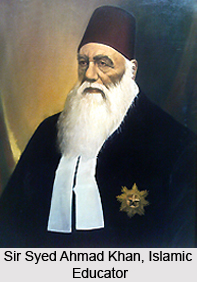 Sir Syed Ahmed Khan was an Indian educator and politician who pioneered modern education for the Muslim community in India by founding the Muhammedan Anglo-Oriental College, which later developed into the Aligarh Muslim University. His work gave rise to a new generation of Muslim intellectuals and politicians who composed the Aligarh Movement to secure the political future of Muslims in India. Sir Syed Ahmad was granted the title of `Javad-ud-Daulah` by Bahadur Shah Zafar, the last Mughal emperor in the year 1842 and this title was given to Syed Hadi, the grandfather of Sir Syed Ahmad during the middle portion of 18th century by Shah Alam I. Syed Ahmad?s contribution the Urdu language as the mother tongue of Indian Muslims is praiseworthy, apart from his motivation towards the growth of a new generation of Muslim politicians. Although hailed as a great Muslim leader and social reformer, Sir Syed remains the subject of controversy for his views on Hindu-Muslim issues.
Sir Syed Ahmed Khan was an Indian educator and politician who pioneered modern education for the Muslim community in India by founding the Muhammedan Anglo-Oriental College, which later developed into the Aligarh Muslim University. His work gave rise to a new generation of Muslim intellectuals and politicians who composed the Aligarh Movement to secure the political future of Muslims in India. Sir Syed Ahmad was granted the title of `Javad-ud-Daulah` by Bahadur Shah Zafar, the last Mughal emperor in the year 1842 and this title was given to Syed Hadi, the grandfather of Sir Syed Ahmad during the middle portion of 18th century by Shah Alam I. Syed Ahmad?s contribution the Urdu language as the mother tongue of Indian Muslims is praiseworthy, apart from his motivation towards the growth of a new generation of Muslim politicians. Although hailed as a great Muslim leader and social reformer, Sir Syed remains the subject of controversy for his views on Hindu-Muslim issues.
He was one of the most influential Muslim politicians of his time. Sir Syed was suspicious of the Indian independence movement and called upon Muslims to loyally serve the British Raj. He denounced nationalist organisations such as the Indian National Congress, instead forming organisations to promote Muslim unity and pro-British attitudes and activities. Sir Syed promoted the adoption of Urdu as the language of all Indian Muslims, and mentored a rising generation of Muslim politicians and intellectuals.
Early Life of Syed Ahmed Khan
 Syed Ahmed Khan, a renowned freedom fighter was born in Delhi, which was the capital of the Mughal Empire. He was a popular politician and educator and also a modernist and reformer for Islam. His family is also said to have migrated from Arabia to Wamghan in Iran, and then shifted to Heart (now located in Afghanistan) in the time of Akbar. Since then many generation of his family been highly connected with the Mughal administration. His maternal grandfather Khwaja Fariduddin served as wazir in the court of Akbar Shah II. Syed Hadi, his paternal grandfather, held a mansab, a high ranking administration position and honorary name of Jawwad Ali Khan in the court of Alamgir II. Sir Syed`s father was named Mir Muhammad Muttaqi who was personally very close to Akbar Shah II and also served in the court as personal adviser.
Syed Ahmed Khan, a renowned freedom fighter was born in Delhi, which was the capital of the Mughal Empire. He was a popular politician and educator and also a modernist and reformer for Islam. His family is also said to have migrated from Arabia to Wamghan in Iran, and then shifted to Heart (now located in Afghanistan) in the time of Akbar. Since then many generation of his family been highly connected with the Mughal administration. His maternal grandfather Khwaja Fariduddin served as wazir in the court of Akbar Shah II. Syed Hadi, his paternal grandfather, held a mansab, a high ranking administration position and honorary name of Jawwad Ali Khan in the court of Alamgir II. Sir Syed`s father was named Mir Muhammad Muttaqi who was personally very close to Akbar Shah II and also served in the court as personal adviser.
However, Sir Syed Ahmed Khan was born as a time when disobedient governors, and regional insurrections and British colonialism had diminished the degree and authority of Mughal state, plunging its monarch to figurehead. Sir Syed, with his elder brother - Syed Muhammad Khan, was raised in a big house in a rich and wealthy family. Both the brothers were brought up according to strict rules of Islam, and were exposed to serious politics. Both the brothers were highly inspired by their mother - Azis-un-Nisa. She raised both the boys with rigid discipline and good education.
From a very young age Syed was encouraged to read the Holy Quran by a female tutor. He received traditional education to Muslim nobility in Delhi. He learned various languages like Persian, Arabic, Urdu and religious subjects under the guidance of Hamiduddin. He also read the works of Muslim writers and scholars as Sahbai, Rumi and Ghalib. There were separate teachers who also instructed him in mathematics, astronomy and Islamic jurisprudence. Sir Syed was good in sports as well like swimming, wrestling and other outdoor games. He took an active part in the Mughal court`s cultural activities.
His elder brother founded the first printing in their city in Urdu Language along with the journal Sayyad-ul-Akbar. He later pursued education in medicine, but did not complete the course. Until his father died in the year 1838, Sir Syed had lived a life customary for a rich and affluent young noble. After his father`s death he inherited the titles of his grandfather and father and was awarded the title Arif Jung by Emperor Bahadur Shah Zafar. Syed`s education came to an end due to financial difficulties, but he continued with the education in private - reading books on various subjects. Sir Syed assumed editorship of his brother`s journal and rejected offers of employment from the Mughal court.
Career of Syed Ahmed Khan
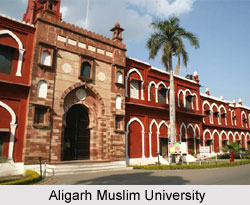 Career of Syed Ahmed Khan is filled with academic achievements. There were social reforms in Muslim society which were initiated by Abdul Latif. He also founded "The Mohammedan Literary Society" in Bengal. Along with this he also worked towards setting up Aligarh Muslim University.
He, throughout his life, condemned and vehemently opposed superstitions, ignorance and evil customs prevalent in Muslim society. He also believed that Muslim community would not move forward without proper education and involvement of western education. As soon as he realized the consistent decline of Mughal political power, Syed entered the British East India Company`s civil service. As a result he was chosen as the serestadar at the courts of law in Agra, responsible for record-keeping and managing court dealings. Thereafter he was promoted to the post of Munshi in the year 1840. Eighteen years later, in 1858 he was appointed to high ranking post at court in Muradabad, where be begun working on his most famous literary work.
Career of Syed Ahmed Khan is filled with academic achievements. There were social reforms in Muslim society which were initiated by Abdul Latif. He also founded "The Mohammedan Literary Society" in Bengal. Along with this he also worked towards setting up Aligarh Muslim University.
He, throughout his life, condemned and vehemently opposed superstitions, ignorance and evil customs prevalent in Muslim society. He also believed that Muslim community would not move forward without proper education and involvement of western education. As soon as he realized the consistent decline of Mughal political power, Syed entered the British East India Company`s civil service. As a result he was chosen as the serestadar at the courts of law in Agra, responsible for record-keeping and managing court dealings. Thereafter he was promoted to the post of Munshi in the year 1840. Eighteen years later, in 1858 he was appointed to high ranking post at court in Muradabad, where be begun working on his most famous literary work.
With the close dealings with high ranking officers of British Empire in India, Sir Syed gathered knowledge about the British colonial politics during his service at the courts. With the outbreak of Revolt of 1857 Sir Syed Ahmed Khan was serving as the chief assessment officer at the courts in Bijnor. Northern India became an important junction for intense fighting. This conflict had left a lot of people - civilians dead. One time centres of Muslim power like Delhi, Agra, Lucknow and Kanpur were greatly affected. Personally, Sir Syed was immensely affected by the violence and the ending of Mughal dynasty among many other long standing kingdoms. He lost quite a few close relatives who died in the aggression. Although he succeeded in rescuing his mother from the turmoil, she died in Meerut, due to the deprivations she had experienced
Political Career of Syed Ahmed Khan
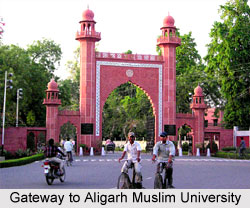 Political career of Sir Syed Ahmed Khan had a glorious phase and was very happening indeed. In the year 1878, Sir Syed was nominated to the post of Viceroy`s Legislative Council. He even testified before the education commission to promote the setting of more colleges and schools and learning institutions across India.
Political career of Sir Syed Ahmed Khan had a glorious phase and was very happening indeed. In the year 1878, Sir Syed was nominated to the post of Viceroy`s Legislative Council. He even testified before the education commission to promote the setting of more colleges and schools and learning institutions across India.
In the very same year, Sir Syed also founded the Muhammadan Association to encourage and promote political co-operation amongst the Indian Muslims from various parts of the country. In the year 1886 he also organized the All India Muhammadan Educational Conference in Aligarh, which supported his vision of modern education and political unity for Muslims. His works also helped to make him most important Muslim politician in 19th century India, often influencing the attitude of Muslims on various national issues.
It was seen that apart from all the good works that he did, he also supported the Indian political leaders like Surendranath Banerjea and Dadabhai Naoroji to get hold of representation for Indians in the government and civil services. In the year 1883, he founded the Muhammadan Civil Service Fund Association to support and encourage the entry of Muslim graduates into the Indian Civil Service (ICS). The fear of complete loss of Muslim political power owning to the community`s backwardness, Sir Syed was also very much averse to the prospect of democratic self-government that would also give control of the government to the Hindu majority population.
Scholarly Works of Syed Ahmed Khan
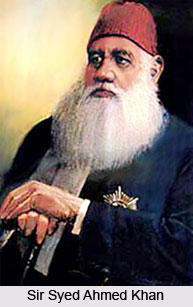 Syed Ahmed Khan was a popular name in the Indian freedom struggle. While he was still working as a jurist, Sir Syed focussed in writing. Right from the age of 23 in the year 1840 he indulged in writing on various topics. He wrote in Urdu language.
Syed Ahmed Khan was a popular name in the Indian freedom struggle. While he was still working as a jurist, Sir Syed focussed in writing. Right from the age of 23 in the year 1840 he indulged in writing on various topics. He wrote in Urdu language.
His first published writing, that saw him beginning his career as writer, was on religious subjects in the year 1842. He also published book A`thar-as-sanadid (Great Monuments) that also documented antiquities of Delhi dating from the medieval era. This entire ambit of work helped him to e
In the year 1842 Sir Syed completed Jila-ul-Qulub bi Zikr-il Mahbub and the Tuhfa-i-Hasan, along with the Tahsil fi jar-i-Saqil in 1844. These works mainly focussed on cultural and religious subjects.
In 1852, he also published two of his works namely; Namiqa dar bayan masala tasawwur-i-Shaikh and Silsilat ul-Mulk. Two years later, saw him realising the second edition of A`thar-as-sanadid. He also penned a commentary on Bible (thus becoming the first Muslim to do so), in which he argued that Islam, as a religion, was close to Christianity. His other texts like Loyal Muhammadans of India, Tabyin-ul-Kalam and A Series of Essays on the Life of Muhammad and Subjects Subsidiary Therein assisted to produce soothing environment between the British authorities and the Muslim community.
Sir Syed Ahmad, right through his life, found ample time for scholarly and literary pursuits. The range of his literary and scholarly interests was very wide: history, politics, archaeology, journalism, literature, religion and science. The scope of his major writings is indeed amazing, majority are listed as follows:
Legal works by Sir Syed Ahmad
1. Act No. 10 (Stamp Act) 1862.
2. Act No. 14 (Limitation) Act 1859-1864.
3. Act No. 16 (Regarding registration of documents) - Allygurh, 1864.
Religious works by Sir Syed Ahmad
4. Ahkam Tu`am Ahl-Kitab
5. Al-Du`a Wa`l Istajaba
6. Al-Nazar Fi Ba`z Masa`il Imam Al-Ghazzali
7. Izalat ul-Chain as Zi`al Qarnain
8. Zila al-Qulub ba Zikr al-Mahbub
9. Khulq al-Insan ala ma fi al-Quran
10. Kimiya-i-Sa`dat
11. Mazumm ba nisbat tanazzul ulum-i-diniya wa Arabiya wa falsafa-i-Yunaniya
12. Namiqa fi Bayan Mas`ala Tasawwur al-Shaikh
13. Rah-i-Sunnat dar rad-i-bid`at
14. Risala Ibtal-i-Ghulami
15. Risala ho wal Mojud
16. Risala Tahqiq Lafzi-i-Nassara
17. Tabyin-ul-Kalam fi Tafsir-al-turat-wa`l Injil ala Mullat-al-Islam (Muhammedan Commentary on the Holy Bible).
18. Tafsir-ul-Qura`n
19. Tafsir al-Jinn Wa`l Jan ala ma fi al-Qur`an
20. Tafsir-a-Samawat
21. Tahrir fi Usul al-Tafsir
22. Tarjama fawa`id al-afkar fi amal al-farjar
23. Tarqim fi qisa ashab al-kahf wal-Raqim
24. Tasfiyad al`Aquid (Being the correspondence between Syed Ahmad Khan and Maulana Muhammad Qasim of Deobund).
Historical works by Sir Syed Ahmad
25. A`in-e-Akbari
26. Asar-us-Sanadid (i) Syed-ul-Akhbar, 1847, (II) Mata-i-Sultani
27. Description des monument de Delhi in 1852, D`a Pre Le Texte Hindostani De Saiyid Ahmad Khan (tr. by M. Garcin De Tassy)
28. Jam-i-Jum, Akbarabad
29. Silsilat-ul-Muluk, Ashraf ul Mataba`
30. Tarikh-i-Firoz Shahi.
31. Tuzuk-i-Jahangiri
Biographical works by Sir Syed Ahmad
32. Al-Khutbat al-Ahmadiya fi`l Arab wa`I Sirat al-Muhammadiya
33. Sirat-i-Faridiya
34. Tuhfa-i-Hasan
Political works by Sir Syed Ahmad
35. Asbab-i-Bhaghwat-i-Hind
36. Lecture Indian National Congress Madras Par
37. Lectures on the Act XVI of 1864, delivered on the 4th Dec., 1864 for the Scientific Society
38. Musalmanon ki qismat ka faisla
39. On Hunter`s: Our Indian Mussulmans`
40. Present State of Indian Politics (Consisting of lectures and Speeches)
41. Sarkashi Zilla Binjor
Journals, Reports Proceedings, Etc by Sir Syed Ahmad
1. Tehzeeb-ul-Ikhlaq.
2. Aligarh Institute Gazette.
3. Proceedings of the Muhammadans Educational Conference.
4. An Account of the Loyal Muhammadans of India, Parts I, II, III, Moufussel Press, Meerut, 1860.
5. Proceedings of the Scientific Society.
6. Bye-Laws of the Scientific Society.
7. Addresses and speeches relating to the Muhammedan Anglo-Oriental College in Aligarh
Syed Ahmed Khan’s Contribution to Education
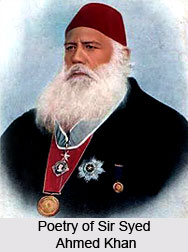 Syed Ahmed Khan`s contribution to education began with the strong passion for education. Right through the 1850s Sir Syed Ahmed Khan was deeply involved into education. While pursuing studies of different subject which included many foreign subjects, Sir Syed also began to realize the advantages of various subjects of Western-style education that was being offered at the newly established colleges across India.
Syed Ahmed Khan`s contribution to education began with the strong passion for education. Right through the 1850s Sir Syed Ahmed Khan was deeply involved into education. While pursuing studies of different subject which included many foreign subjects, Sir Syed also began to realize the advantages of various subjects of Western-style education that was being offered at the newly established colleges across India.
Inspite of being a devout Muslim, Sir Syed also criticized the influence of conventional orthodoxy pertaining to religion and society that made of the Muslims in India suspicious of British influences. Sir Syed also started to feel increasingly concerned for the future of the Muslim community. Being born and brought up in an elite and posh household Sir Syed was very well aware of the best of Muslim tradition and also knew about the steady decline of the political power of Muslim across the country.
The hostility between the Muslims and British before and after the rebellion (Revolt of 1857) threatened to marginalize Muslim communities across India for many generations. He also started to whole-heartedly promote the co-operation with British authorities, promoting loyalty to the Empire amongst Indian Muslims. Sir Syed was fully committed towards upliftment of Muslims and also founded the modern madrassa in Muradabad district in 1859 - the first religious schools to impart scientific education.
Sir Syed also contributed towards societal upheaval, thus helping to organize relief for the famine struck people of North West Province in 1860. He also set up another modern school in Ghazipur in 1863.
As soon as Sir Syed transferred to Aligarh in 1864, he started to work as an educator. He also set up the Scientific Society of Aligarh, the first scientific association of its kind in Indian sub-continent. It was actually modelled after the Royal Society and the Royal Asiatic Society; Sir Syed assembled Muslim scholars from different parts of the country. The society also held annual conferences, disbursed funds for educational causes and also regularly published a journal on the scientific subjects in Urdu language and English. Sir Syed also felt that the socio-economic future of Muslims was threatened by their orthodox aversions to modern science and technology.
He also published many writing promoting liberal, rational interpretation of religion and social taboo. Sir Syed also holds the view that Jesus mentioned in Holy Quran died and there is no avenue for any new messiah and neither a messiah is needed for Muslims as Islam is a complete religion. On the pre-colonial system he said "The rule of the former emperors and rajas was neither in accordance with the Hindu nor the Prophet Mohammadan religion. It was based on nothing but tyranny and oppression; the law of might was that of right; the voice of the people was not listened to" (Bipan Chandra: India`s struggle for independence).
Syed Ahmed Khan’s Association with Mirza Galib
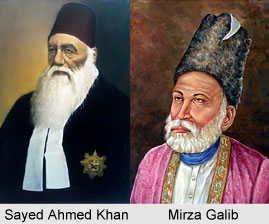 Syed Ahmed Khan`s Association with Mirza Galib was rather very cordial and affectionate. In the year 1855, when Sir Syed Ahmed Khan finished his highly researched and scholarly work of Abul Fazl`s Ai`n-e Akbari (which in itself is a difficult book), he approached the great Mirza Asadullah Khan Ghalib to write a taqriz (in the convention of the times, a laudatory foreword) for it. Galib, the humble person that he was, kindly obliged.
Syed Ahmed Khan`s Association with Mirza Galib was rather very cordial and affectionate. In the year 1855, when Sir Syed Ahmed Khan finished his highly researched and scholarly work of Abul Fazl`s Ai`n-e Akbari (which in itself is a difficult book), he approached the great Mirza Asadullah Khan Ghalib to write a taqriz (in the convention of the times, a laudatory foreword) for it. Galib, the humble person that he was, kindly obliged.
Ghalib obliged, but what he did produce was a short Persian poem castigating the Ai`n-e Akbari, and by implication, the imperial, extravagant, literate and learned Mughal culture of which it was a product. The least that he said was that the book was of little value and did not have much worth. Galib highly reprimanded the works of Syed Ahmad Khan for wasting his talents and time on dead things. What was even worse was that he praised sky-high the "sahibs of England" who at that time held all the keys to all the a`ins in this world.
Galib was greatly aware of the changes that were brought about by the Europe politics. Sir Syed, it can be said that, was highly annoyed with Ghalib`s admonitions, but he would also have realized that Ghalib`s reading of the situation, though not nuanced enough, was basically accurate.
Sir Syed later felt that he was the one who was better educated in English language ans well aware of the western society. Hence should have, by him, seen the change that now seemed to be just round the corner. Sir Syed Ahmad Khan never again wrote a word in praise of the Ai`n-e Akbari and in fact gave up taking active interest in history and archaeology, and became a social reformer.
Legacy of Syed Ahmed Khan
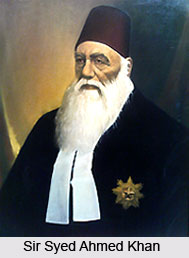 Legacy of Sir Syed Ahmed Khan is filled with richness in reformist movements and social changes. He lived the last twenty years of his life in Aligarh, and is regarded as the most influential Islamic politician and entrepreneurs in the 19th-20th century. He was also the most sorts after politician in India - who had the power to move a majority of Muslims.
Legacy of Sir Syed Ahmed Khan is filled with richness in reformist movements and social changes. He lived the last twenty years of his life in Aligarh, and is regarded as the most influential Islamic politician and entrepreneurs in the 19th-20th century. He was also the most sorts after politician in India - who had the power to move a majority of Muslims.
Sir Syed, after battling serious illness, died on 27th March 1898. He was also buried besides Sir Syed Masjid inside the very campus of Aligarh Muslim University. His funeral was attended by millions of students, Muslim leaders and British officials. Sir Syed is also widely respected across the South Asia as a successful Muslim reformer and visionary. And at the very same time he sought to politically provide allegiance to the British Government. Sir Syed, an awarded loyalist of the British Empire in India, was nominated as a member of Civil Service Commission in the year 1887 by Lord Dufferin.
In the year 1888, he also set up the United Patriotic Association at Aligarh to promote political co-operation with the British and Muslim participation in the government. In the same year Sir Syed was knighted by the British Government and the very next year he received an LL.D. from the Edinburgh University.
The educational institution he formed - Aligarh Muslim University remains as one of the post important institutions. Well-known alumni of Aligarh also include Muslim political leaders Maulana Mohammad Ali, Abdur Rab Nishtar, Maulana Shaukat Ali and Maulvi Abdul Haq, who is hailed in Pakistan as Baba-e-Urdu (Father of Urdu). Liaquat Ali Khan and Khawaja Nazimuddin, the first two Prime Ministers of Pakistan and also the President Dr. Zakir Hussain, are amongst Aligarh`s most famous graduates.
Advocacy of Urdu Language by Syed Ahmed Khan
The success of the Hindi movement led to advocacy of urdu language by syed ahmed khan, as the symbol of Muslim heritage and as the language of all Indian Muslims. His educational and political work grew increasingly centred around and exclusively for Muslim interests. He also sought to persuade the British to give Urdu extensive official use and patronage. Sir Syed is widely criticised for making the use of Urdu a political issue that served as a wedge between Muslims and Hindus, who saw Sir Syed`s advocacy as an effort to re-establish Muslim leadership. To Muslims in northern and western India, Urdu had become an integral part of political and cultural identity. However, the division over the use of Hindi or Urdu further provoked communal conflict between Muslims and Hindus in India. Acquainted with high-ranking British officials, Sir Syed obtained close knowledge about British colonial politics during his service at the courts.
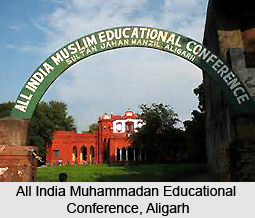 At the outbreak of the Indian rebellion, on May 10, 1857, Sir Syed was serving as the chief assessment officer at the court in Bijnor. Northern India became the scene of the most intense fighting. The conflict had left large numbers of civilians dead. Erstwhile centres of Muslim power such as Delhi, Agra, Lucknow and Kanpur were severely affected. Sir Syed was personally affected by the violence and the ending of the Mughal dynasty amongst many other long-standing kingdoms. Sir Syed and many other Muslims took this as a defeat of Muslim society. He lost several close relatives who died in the violence. Although he succeeded in rescuing his mother from the turmoil, she died in Meerut, owing to the privations she had experienced.
At the outbreak of the Indian rebellion, on May 10, 1857, Sir Syed was serving as the chief assessment officer at the court in Bijnor. Northern India became the scene of the most intense fighting. The conflict had left large numbers of civilians dead. Erstwhile centres of Muslim power such as Delhi, Agra, Lucknow and Kanpur were severely affected. Sir Syed was personally affected by the violence and the ending of the Mughal dynasty amongst many other long-standing kingdoms. Sir Syed and many other Muslims took this as a defeat of Muslim society. He lost several close relatives who died in the violence. Although he succeeded in rescuing his mother from the turmoil, she died in Meerut, owing to the privations she had experienced.
Sir Syed blamed the British East India Company for its aggressive expansion as well as the ignorance of British politicians regarding Indian culture. However, he gained respect for British power, which he felt would dominate India for a long period of time.




















